Memecoin or not, transacting Dogecoin safely is essential for every user.
Cryptocurrencies are all about public speculation, and Dogecoin has done well on that front.
From the Doge Foundation raising $50K for Kenya’s water shortage to Elon Musk briefly changing Twitter’s logo to a Doge, this coin has unparalleled goodwill among other meme coins.
In addition, Dogecoin has vibrant communities that keep the conversations afloat on Reddit, Twitter, TikTok, etc. This activity helps Dogecoin enjoy a commanding position among meme tokens, and it beats the next best (Shiba Inu) by almost 100% in the current market cap.
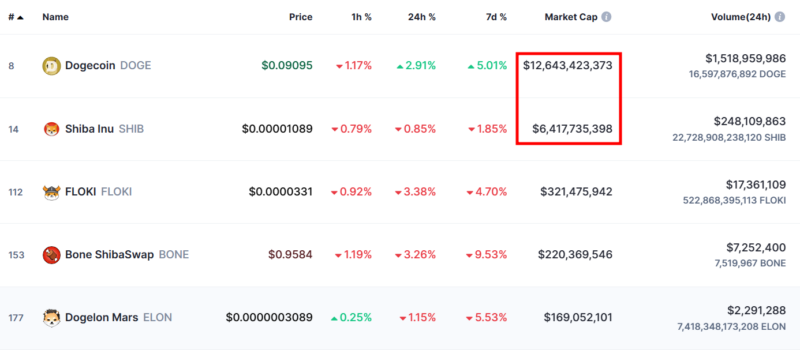
Among others, Dogecoin’s most prominent use case is as a tip coin. However, it goes without saying that Dogecoin’s value can see wild swings, just like any other crypto. And, one should only invest the amount they are ready to lose.
With that warning out of our way, let’s look at some crypto wallet lingo to help you make the right choice.
Crypto Wallets: How to choose?
There are many Dogecoin wallets in the market. Even our list has more than a few, which makes it really difficult to pick the best one.
And actually, there isn’t any universal solution for every crypto problem. Each user has their own requirements, and so the wallet they end up choosing varies.
#1. Software or Hardware
Hardware crypto wallets provide additional safety but hardly work on their own. So, they usually ship with a dedicated interface or an app that functions similarly to a third-party software wallet.
In the end, every hardware wallet needs to be integrated with software (wallet) to function. Keeping that in mind, this list chiefly covers software (hot) wallets. And if you already have a hardware wallet, you should search which third-party hot wallets it supports before proceeding.
#2. Custodial or non-custodial
“Your keys, Your coins” is as old a saying as the cryptocurrencies themselves.
Here, non-custodial or self-custodial wallets mean private keys are protected by the wallet owners. On the other hand, custodial wallets will have someone else (normally a crypto exchange) manage a user’s private keys.
Ideally, crypto enthusiasts vouch for non-custodial wallets for obvious reasons. Primarily, the crypto-verse has constantly been rocked with hacks that targeted crypto exchanges, resulting in vanished coins with no sign of recovery.
Therefore, as an individual, there is a negligible chance someone will be the target of skilled hackers.
On the contrary, consider your crypto gone if you have lost your device and the private keys. Or, if you can’t safeguard yourself from the ever-evolving web3 phishing scams.
Finally, non-custodial wallets for tech-savvy users who can keep their private keys safe, and custodial wallets for others.
#3. Multi-Currency and Other Features
Multi-currency wallets normally come with a convenience factor, allowing one to manage many coins on a single application.
In addition, they can have features like staking, crypto loans, trading, etc. However, not all users need them, and it’s best to look for the bare minimum because more functionality translates to more code, which means a greater attack surface for hackers.
Moreover, their cross-platform presence also differs. For example, there are only a handful of options for a Dogecoin wallet for Linux or even a Mac.
Consequently, make a list of features you need at present or in the near future and the device you’ll use them on before trying to pick your Dogecoin wallet.
So, these were a few things to clear before jumping on this list (in no particular order), starting with…
Infinity Wallet
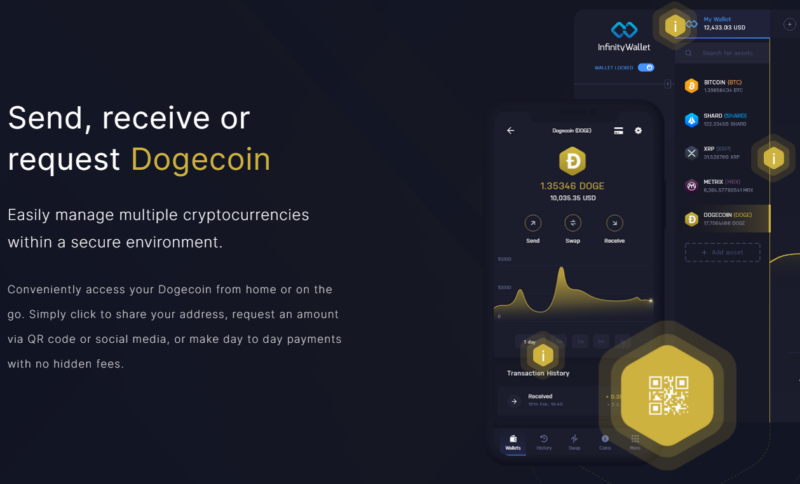
Infinity Wallet helps you to transact, monitor, and exchange Dogecoin for other cryptos effortlessly. It’s a self-custodial (private keys on the device) crypto wallet that can generate the wallet seed while offline.
A seed is a 12-24 words mnemonic phrase used to restore a crypto wallet.
This wallet brands itself as “the only digital wallet you need”. Consequently, it’s a multi-currency wallet (Dogecoin included) with native Windows, MacOS, and Linux apps, with smartphone versions listed as ‘coming soon’.
What needs a special mention is the handy portfolio monitoring. This lets you set price alerts for Dogecoin alone or the entire wallet.
Finally, Infinity Wallet supports over 150K+ digital assets, giving you access to multiple blockchains and dApps from a single dashboard.
YouHodler
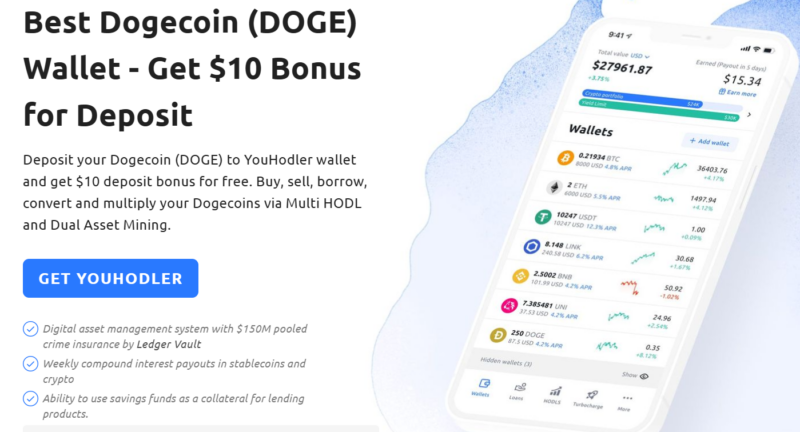
YouHodler is not just a wallet; it has a crypto exchange, crypto loans, and a few other services, making it a little investment hub.
It’s another multi-currency tool that is not an exclusive Dogecoin wallet. And this can be good if you want to do many things with multiple cryptocurrencies without trying out additional tools.
As a signup bonus, a new user gets a $10 incentive to deposit their Dogecoin to YouHodler.
This wallet supports multiple operations, including buy, sell, loan, exchange, multi-HODL, dual investment, etc.
Multi-HODL is like auto trading (but has manual options), where you invest (and risk) some of your coins to start a chain of crypto-backed funds. Here, your collateral is used to buy some crypto, which is again used as collateral to buy even more crypto. The idea is to seek profit by selling assets at a higher price by building a chain of crypto loans. Multi HODL also lets you control the profit and loss margins, which, once achieved, trigger events like selling to close your position.
Similarly, there is a dual investment scheme that assures returns in one of the currencies of your choice. Overall, there is much more to do than a typical crypto wallet offers.
Coming to security, YouHodler uses a combination of hot and cold storage. Besides, the funds are protected with a group insurance policy worth $150 million against multiple risky situations, as mentioned in their FAQs.
Currently, YouHodler is available for Android and iOS.
Atomic Wallet
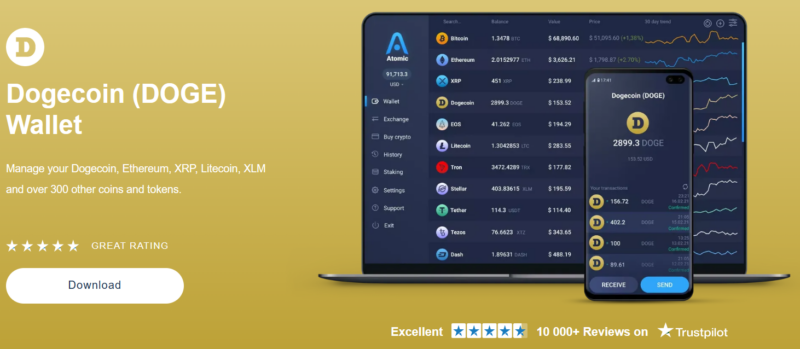
Atomic Wallet is a tool that is multi-currency and offers many cryptos.
The best thing about Atomic is it’s a self-custodial wallet with a clean and minimalist interface. It supports buying, selling, exchanging, and staking, giving you access to over 300 cryptocurrencies, including Dogecoin.
Atomic Wallet is also one of the most anonymous tools of its kind, never asking for any registration or any KYC.
Lastly, Atomic Wallet maintains an excellent cross-platform presence with apps for Windows, MacOS, Linux, Android, and iOS.
ZenGo
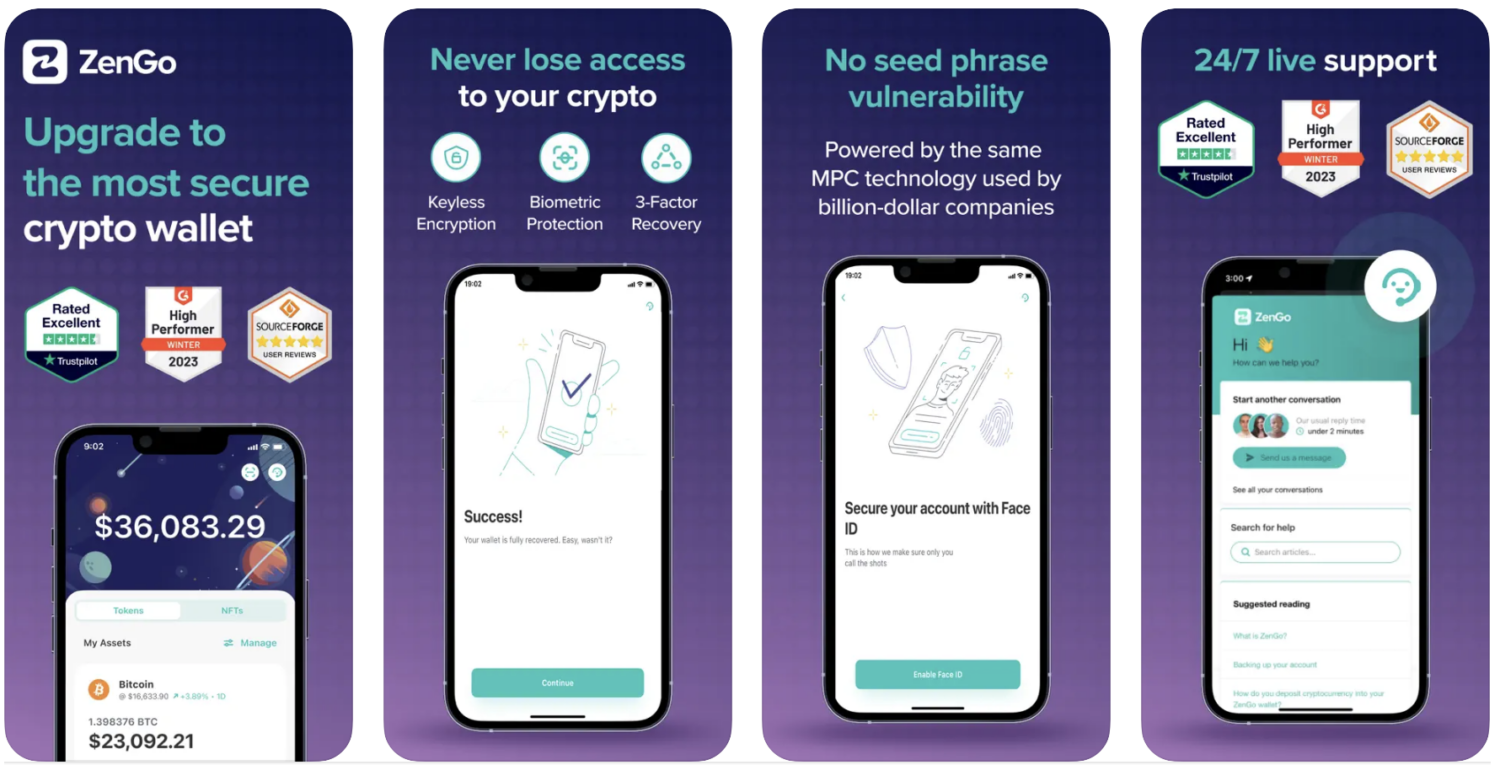
Adding to the list of non-custodial wallets here is this one–ZenGo. It lets you buy, sell, exchange, trade NFTs, and access dApps, with access to over 70+ crypto assets.
However, what sets ZenGo apart from others is its security protocols.
First, it eliminates the ‘seed phrase vulnerability. So, in place of giving all the power to the seed phrase and risking your funds in case of a phishing scam, ZenGo invented MPC: multi-party computation.
Here, you can assume two pieces of the puzzle (share), one stored with you and the other at ZenGo servers (ZenGo also stores your share in encrypted form at their servers). For any transaction, the two shares talk to each other to approve the process.
In addition, ZenGo has three-factor authentication for restoring your wallet on a different device. So, any threat actor can’t just migrate your wallet anywhere without getting access to your email, 3D face scan, and a recovery file backed up with you.
Besides, ZenGo has a firewall to protect its users from Web3 attacks.
Overall, this security landscape seems perfect if ZenGo can keep its servers secure and is slightly different from ‘true’ self-custodial wallets.
ZenGo is available for Android and iOS.
Exodus
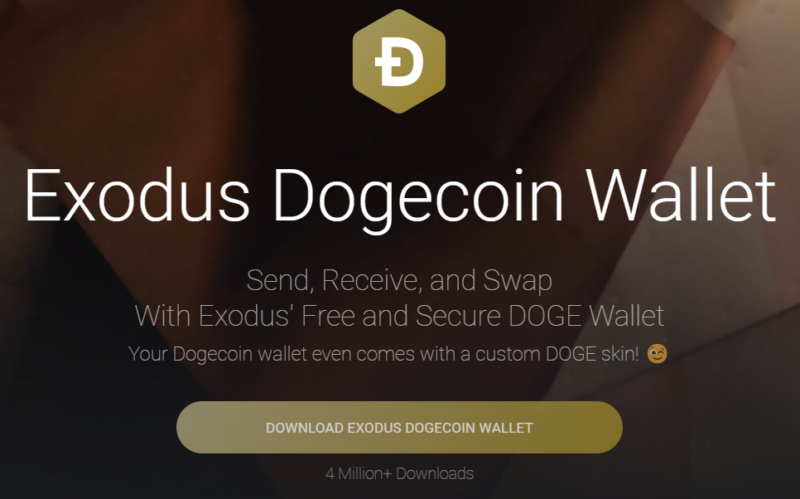
Exodus is a renowned name in the crypto wallet space that needs no account or personal information to start with 260+ crypto assets. Besides, this is also a self-custodial wallet.
Currently, it supports buying, selling, and swapping crypto, trading NFTs, and dApps and is developing its DeFi capabilities with integrated apps. Additionally, it gives you options to earn passive income by staking.
On the security front, Exodus partnered with Trezor, a hardware crypto wallet. Put simply, a hardware (or cold) wallet is the safest way to store and physically authenticate transactions. So technically, you get the beauty and ease of Exodus paired with the robust security of Trezor.
However, it goes without saying that you’ll need a compatible Trezor wallet for this union to work. Still, on its own, Exodus is good enough for a software (or hot) wallet you can use to trade Dogecoin.
Exodus has apps for Windows, MacOS, Linux, Android, and iOS. In addition, you can use this wallet with its browser extension for Chrome and Brave.
Trust Wallet
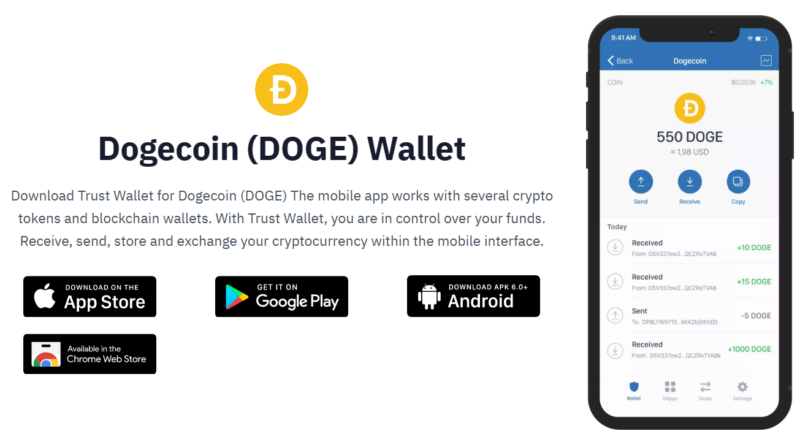
Trust Wallet has it all: crypto trading (buy, sell, & exchange), NFTs, DeFi, and the backing of the biggest crypto exchange, Binance, which is also its parent company.
It’s a multi-chain wallet lets you keep the private keys to yourself. Besides, you can set up this crypto tool without any typical registration.
Trust Wallet supports a staggering 4.5 million crypto assets and covers over 60 blockchains.
You can download Trust Wallet on iOS and Android or use it as a browser extension.
MyDoge
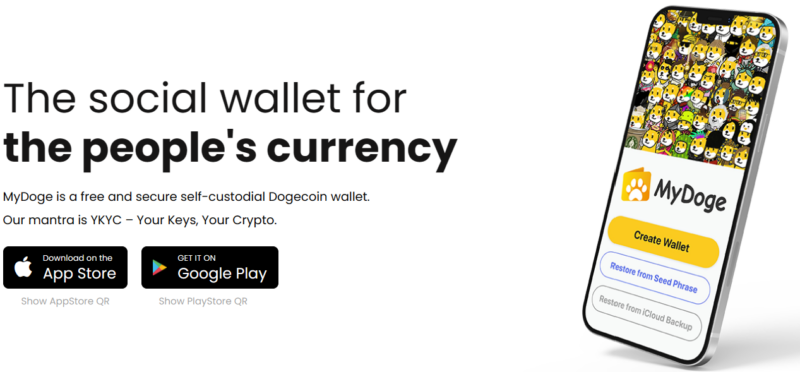
MyDoge is a crypto wallet made especially for Dogecoin enthusiasts. This is a non-custodial wallet that charges ZERO fees as of now. So, all you pay is the network fee, the lowest possible calculated by MyDoge wallet.
This is built keeping in mind the vibrant Dogecoin community and has features like DogeChat, social profiles, tipping, etc. Specifically, DogeChat has a Twitter bot that helps you tip the Twitter creators you admire.
MyDoge’s interface is extremely straightforward. The primary options are to buy, receive, and send Dogecoins. The settings section lets you take manual and cloud backups of the secret phrase.
MyDoge founders have donated one million Dogecoins to the Dogecoin Foundation as a token of their support and appreciation.
Lastly, this is created exclusively for Dogecoin and is available for Android and iOS.
Paybis
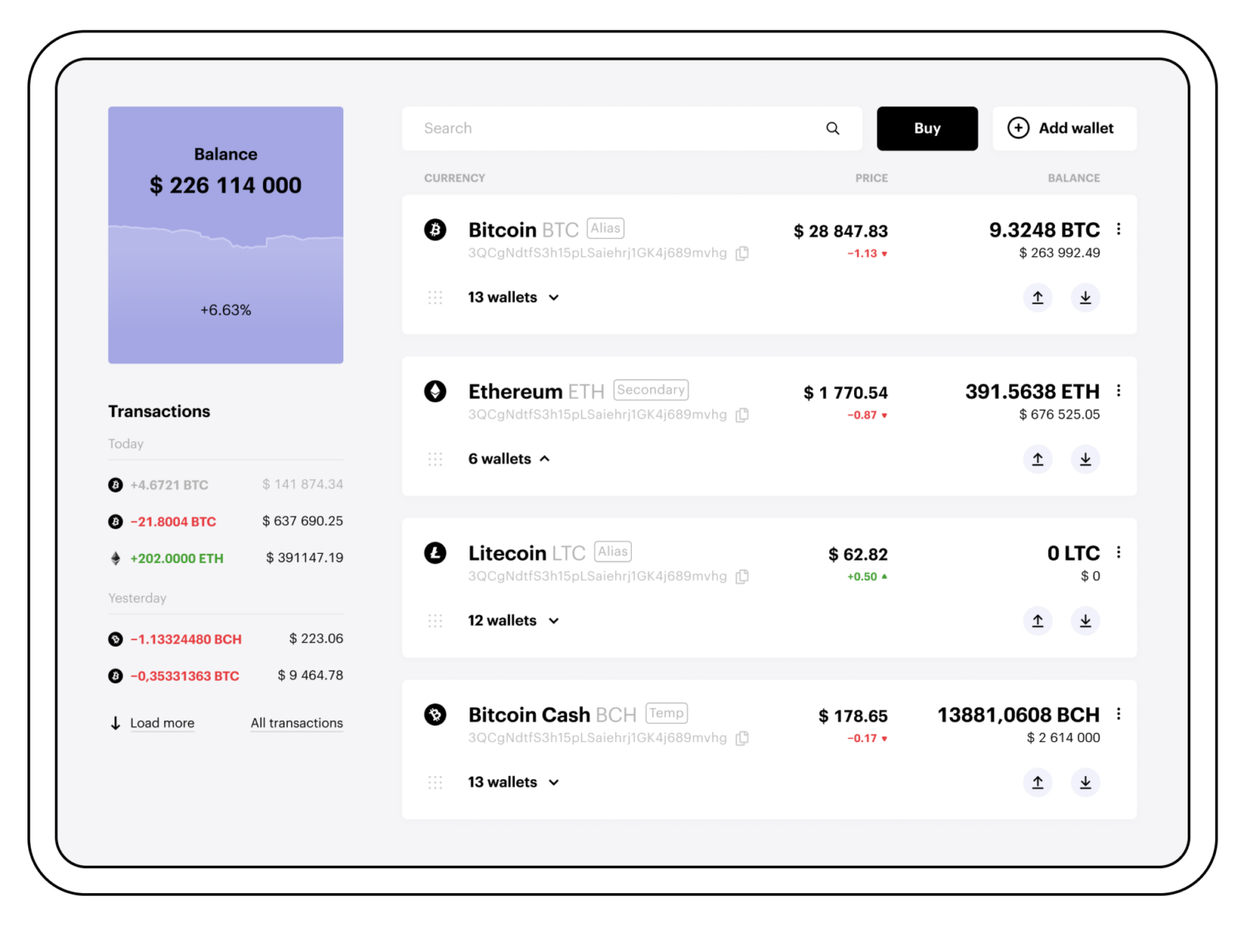
Paybis is a multi-cryptocurrency, custodial wallet with “state-of-the-art” security to manage your private keys.
Consequently, this is suitable for anyone not wanting to manage their own private keys. Besides, this is mostly about buying and selling multiple cryptos without any additional options like staking, crypto loans, etc.
Notably, this wallet requires identity verification at signup and isn’t suitable for someone in search of an anonymous Dogecoin wallet.
Paybis has apps for Android and iOS, and you can also use them on your web browser.
Dcent Wallet
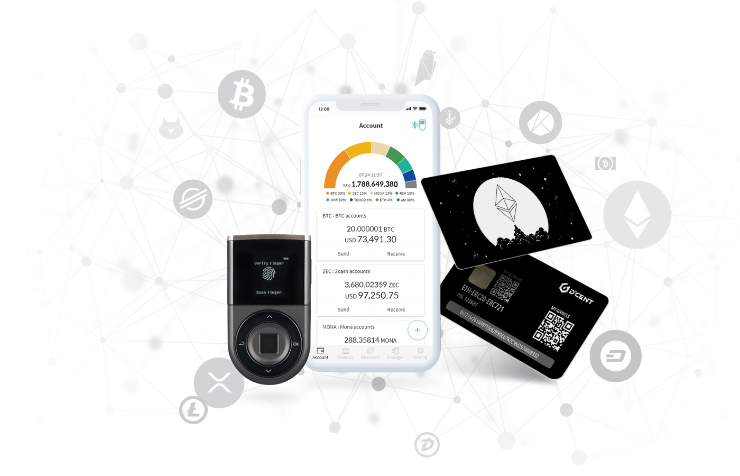
Dcent is a company chiefly into hardware wallets. However, their mobile app can also function as a standalone ‘hot’ Dogecoin wallet.
This a multi-chain wallet, allowing portfolio management for hundreds of cryptocurrencies.
In addition, this has a native dApp browser which indicates compatible applications, including DeFi services you can subscribe to. Moreover, this also integrates with NFT-heavy blockchains.
Overall, this will do for a Dogecoin wallet, but you have more feature-rich options for that. However, it makes much more sense if you’ve their hardware wallet as well.
You can download this software wallet for iOS and Android.
Lumi Wallet
Lumi supports over 1200 cryptocurrencies and is a non-custodial wallet of choice for privacy-sensitive users since one need not give any personal information to use it.
You can have this open-source crypto wallet to buy crypto with a minimum threshold of $50.
In addition, this wallet offers receiving and instant exchange with fixed rates which indicates the exact amount of coins you’re going to get.
Lumi has apps for Android and iOS, and one can also use it directly from any web browser.
Freewallet
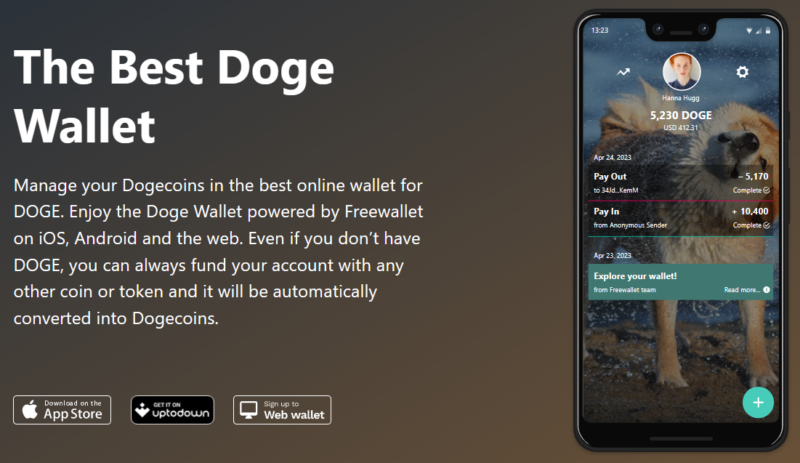
Freewallet is a custodial wallet that works for over 100+ cryptocurrencies and offers ‘fee-free’ transactions with other Freewallet users.
This has a built-in crypto exchange with a promise to hold your coins in ‘cold storage.’
Like many such wallets, you need an account (social media or email) to get started. This same account can be used to recover lost portfolios which means it’s safer for those who can’t keep their private keys secure.
In addition, their website mentions they can “back you up in case of a mistake”. Although, they haven’t indicated real-life applications of such assurances since blockchain transactions are generally permanent.
Finally, you can get this Dogecoin wallet on Android, iOS, and as a web application.
Which One Did You Pick?
We tried to cover some top Dogecoin wallets and hope you found the perfect one for your use case. If you’re still unsure, go through the ‘Crypto Wallet: How to choose’ section once again.
Personally, I would pick Trust Wallet for a multi-coin portfolio and stick to MyDoge if it’s just about Dogecoin. However, you can try others and see how they fare on your scale and what fees they charge to make a more robust decision.
PS: Here are a few security measures for every crypto user.
Si quiere puede hacernos una donación por el trabajo que hacemos, lo apreciaremos mucho.
Direcciones de Billetera:
- BTC: 14xsuQRtT3Abek4zgDWZxJXs9VRdwxyPUS
- USDT: TQmV9FyrcpeaZMro3M1yeEHnNjv7xKZDNe
- BNB: 0x2fdb9034507b6d505d351a6f59d877040d0edb0f
- DOGE: D5SZesmFQGYVkE5trYYLF8hNPBgXgYcmrx
También puede seguirnos en nuestras Redes sociales para mantenerse al tanto de los últimos post de la web:
- Telegram
Disclaimer: En Cryptoshitcompra.com no nos hacemos responsables de ninguna inversión de ningún visitante, nosotros simplemente damos información sobre Tokens, juegos NFT y criptomonedas, no recomendamos inversiones

